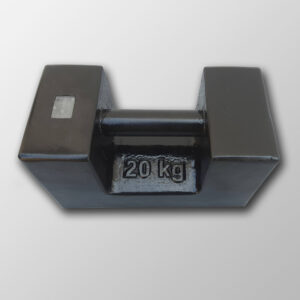
Calibration Weights
Calibration Weights as per OIML R 111-1 Edition 2004(4) Type 1 are certified to be used to ensure that scales or balances are giving you accurate readings. Calibration weights are assigned a class which is based on the accuracy or tolerance of the weight. We are Leading Exporter of Calibration Weights from India. We Export Calibration Weights in Australia, Bahrain, Belgium, Botswana, Canada, Cyprus, Eswatini, France, Germany, Ghana, Ireland, Israel, Kenya, Kuwait, Malta, Malawi, Mauritius, Mozambique, Namibia, New Zealand, Netherland, Oman, Romania, Saudi Arabia, Singapore, South Africa, Tanzania, Thailand, Taiwan, United Arab Emirates, United Kingdom and USA.
OIML: The Organisation Internationale de Métrologie Légale or International Organization of Legal Metrology (OIML) is an intergovernmental organization that provides standards and systems with the goal of harmonizing legal metrology procedures. From lowest (most accurate) to highest tolerance, OIML has classified the Calibration Weights in accuracy classes as E1, E2, F1, F2, M1, M2, and M3.
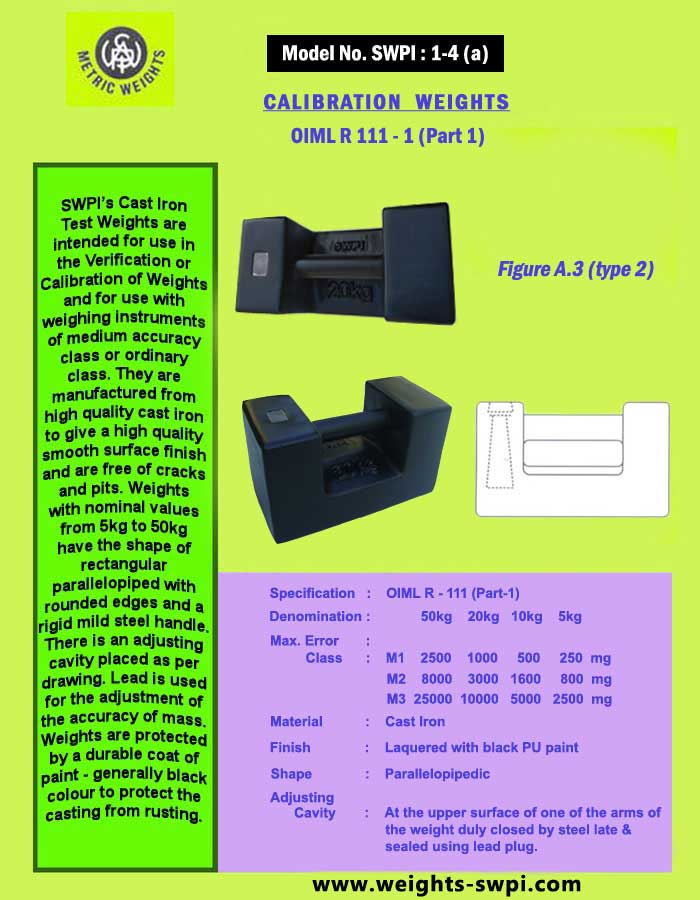
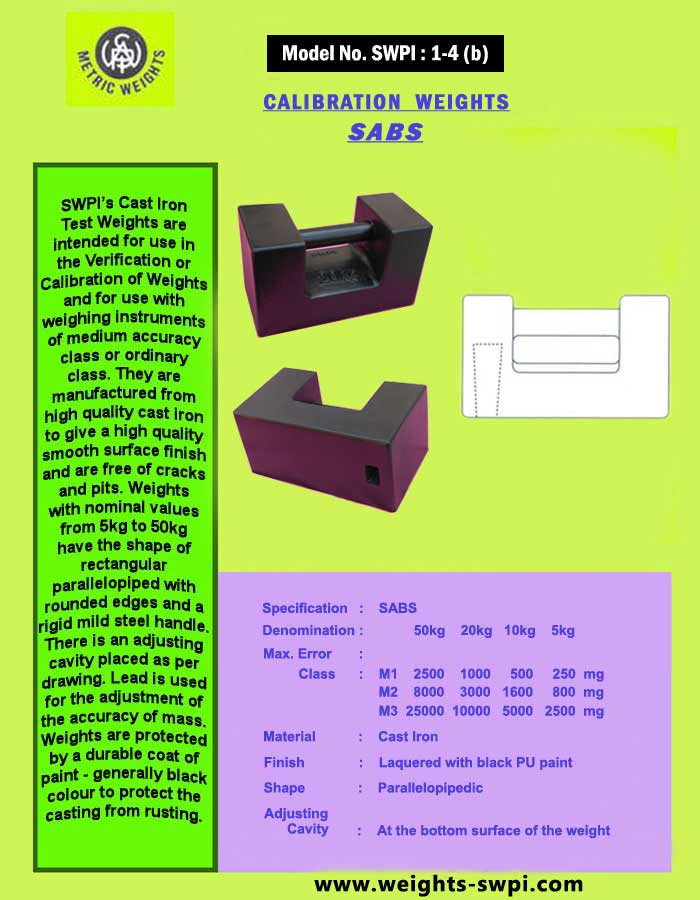
Tolerance Levels
The following tables shows the tolerance levels for the different classes of weights, as per OIML.:
| E1 | E2 | F1 | F2 | M1 | M2 | M3 | |
| mg | mg | mg | mg | mg | mg | mg | |
| 5000 kg | 25000 | 80000 | 250000 | 800000 | 2500000 | ||
| 2000 kg | 10000 | 30000 | 100000 | 300000 | 1000000 | ||
| 1000 kg | 1600 | 5000 | 16000 | 50000 | 160000 | 500000 | |
| 500 kg | 800 | 2500 | 8000 | 25000 | 80000 | 250000 | |
| 200 kg | 300 | 1000 | 3000 | 10000 | 30000 | 100000 | |
| 100 kg | 160 | 500 | 1600 | 5000 | 16000 | 50000 | |
| 50 kg | 25 | 80 | 250 | 800 | 2500 | 8000 | 25000 |
| 20 kg | 10 | 30 | 100 | 300 | 1000 | 3000 | 10000 |
| 10 kg | 5 | 16 | 50 | 160 | 500 | 1600 | 5000 |
| 5 kg | 2.5 | 8.0 | 25 | 80 | 250 | 800 | 2500 |
| 2 kg | 1 | 3 | 10 | 30 | 100 | 300 | 1000 |
| 1 kg | 0.5 | 1.6 | 5 | 16 | 50 | 160 | 500 |
| 500 g | 0.25 | 0.8 | 2.5 | 8.0 | 25 | 80 | 250 |
| 200 g | 0.1 | 0.3 | 1.0 | 3 | 10 | 30 | 100 |
| 100 g | 0.05 | 0.16 | 0.5 | 1.6 | 5.0 | 16 | 50 |
| 50 g | 0.03 | 0.10 | 0.3 | 1.0 | 3.0 | 10 | 30 |
| 20 g | 0.025 | 0.08 | 0.25 | 0.8 | 2.5 | 8.0 | 25 |
| 10 g | 0.020 | 0.06 | 0.20 | 0.6 | 2.0 | 6.0 | 20 |
| 5 g | 0.016 | 0.05 | 0.16 | 0.5 | 1.6 | 5.0 | 16 |
| 2 g | 0.012 | 0.04 | 0.12 | 0.4 | 1.2 | 4.0 | 12 |
| 1 g | 0.010 | 0.03 | 0.10 | 0.3 | 1.0 | 3.0 | 10 |
| 500 mg | 0.008 | 0.025 | 0.08 | 0.25 | 0.8 | 2.5 | |
| 200 mg | 0.006 | 0.020 | 0.06 | 0.20 | 0.6 | 2.0 | |
| 100 mg | 0.005 | 0.016 | 0.05 | 0.16 | 0.5 | 1.6 | |
| 50 mg | 0.004 | 0.012 | 0.04 | 0.12 | 0.4 | ||
| 20 mg | 0.003 | 0.010 | 0.030 | 0.10 | 0.30 | ||
| 10 mg | 0.003 | 0.008 | 0.025 | 0.08 | 0.25 | ||
| 5 mg | 0.003 | 0.006 | 0.020 | 0.06 | 0.20 | ||
| 2 mg | 0.003 | 0.006 | 0.020 | 0.06 | 0.20 | ||
| 1 mg | 0.003 | 0.006 | 0.020 | 0.06 | 0.20 |
Certifications of Weights
While browsing Calibration Weights, you might come across mentions of certifications. Indeed, depending on your application, you may require that your calibration weights come with a certificate confirming that the lab testing the weights is accredited.
ISO/IEC 17025: The International Organization for Standardization (ISO) is an independent non-governmental organization comprising a membership of 164 national standards bodies. The International Electrochemical Commission (IEC) is an international standards organization for electrotechnical fields. Together with other liaison organizations, they created the ISO/IEC 17025 standards. This is the international reference to be used by testing and calibration laboratories that want to display their ability to provide reliable results.
as per
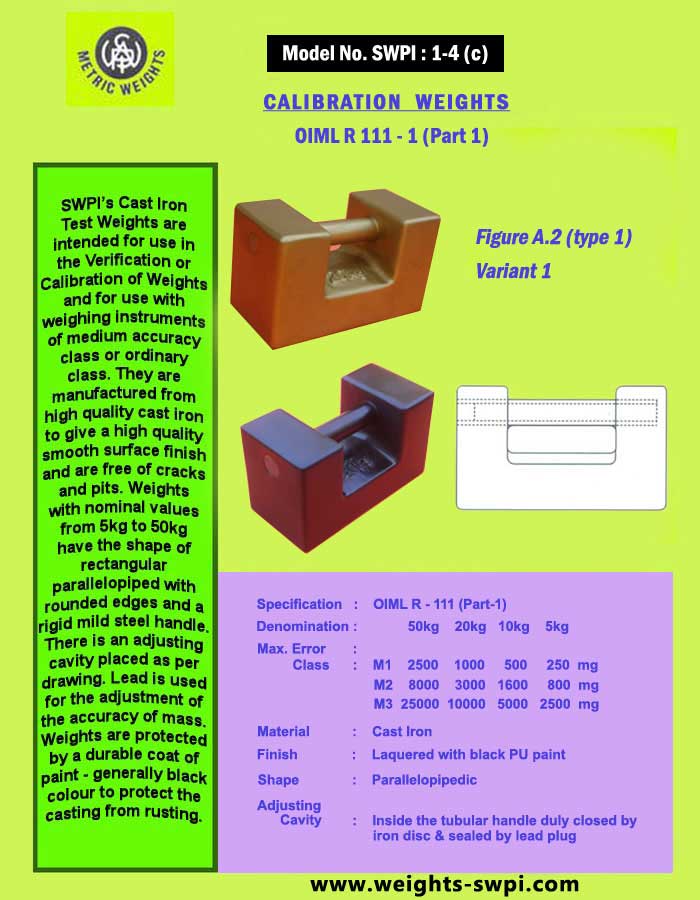
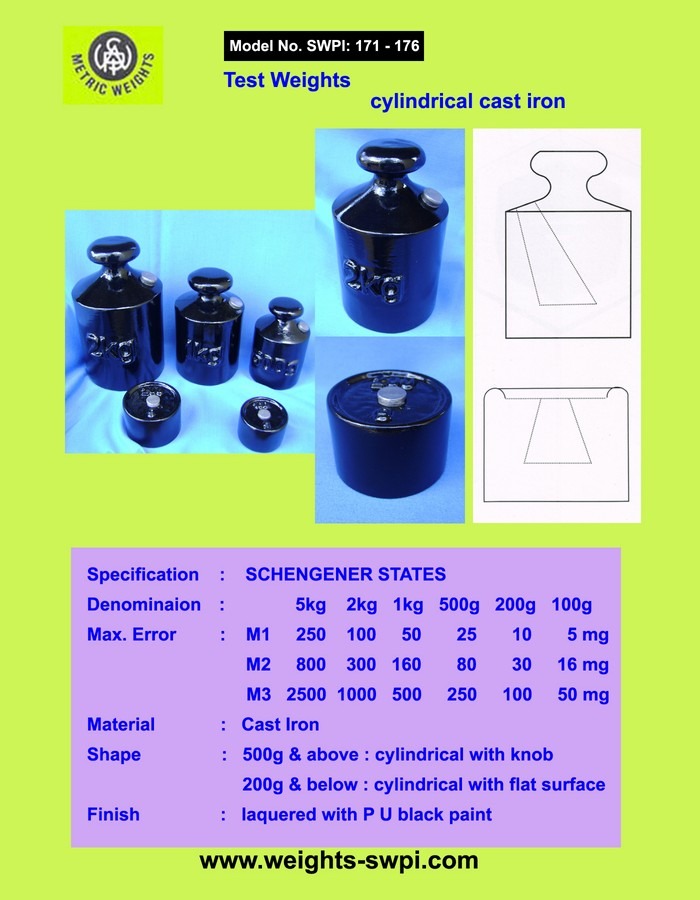
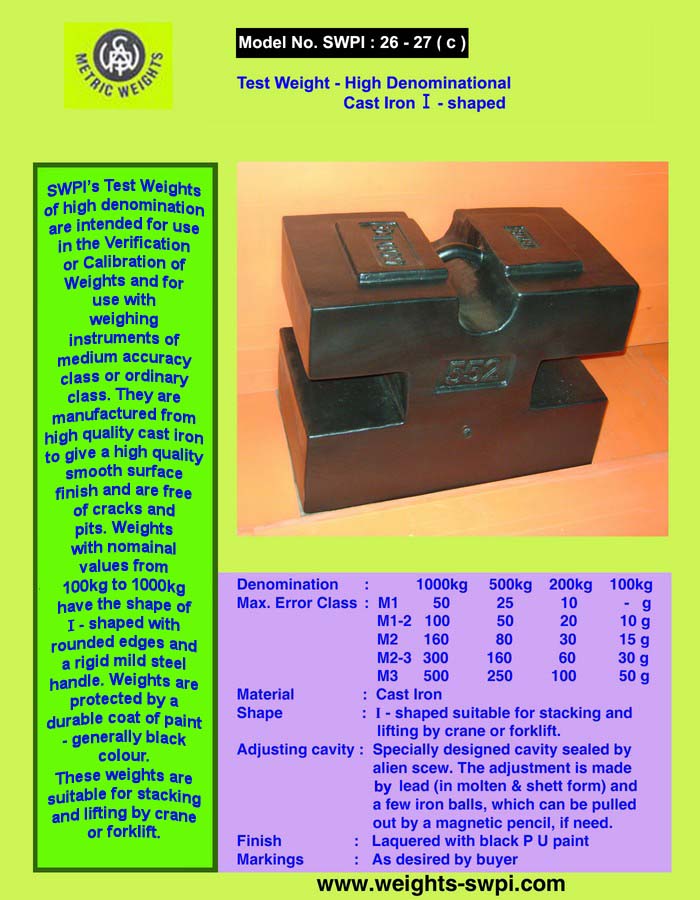
Calibration Weights
To ensure the accurate performance of your weighing scales or balances, it is essential to regularly assess them using calibrated weights. The frequency of these checks—whether daily, weekly, or monthly—depends on the criticality of the measurements to your product or process and the potential consequences of any deviation from tolerance in your weighing equipment.
Cast Iron Bar and Hex Calibration Weights: These weights are the most frequently used for testing industrial, commercial, and retail scales. They are typically adjusted to the M1 tolerance or class, which translates to an accuracy of 1:20,000 or 0.005%. For instance, a 20 kg (20,000g) calibration weight with M1 accuracy will have a maximum error, as supplied, of +/-1g. Please refer to the Weight Classes section for more details.
Cast iron bar and hex calibration weights are designed for single-person handling. The smaller weights, such as 5 kg, 10 kg, 20 kg, and 25 kg, are referred to as bar weights due to the handlebar, while those ranging from 100g to 2 kg have a hexagonal shape. We recommend M1 cast iron calibration weights for checking and calibrating scales with a resolution (readability) of 1g or more. They offer stability in dry environments and are a cost-effective choice compared to other options.
